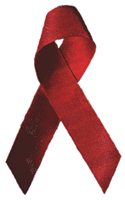Hiv is a virus that attacks the immune system. Human Immunodeficiency Virus or
HIV can affect anyone. There is no certain race, culture, sexual preference, religous
group that this virus affects. Anyone is open to be infected with HIV even you.
Over time HIV develops into what is reffered to as AIDS or Acquired Immune Deficiency
Syndrome. When a person has developed Aids a simple infection can become more serious than
if it was had by a person without Aids. The way the HIV virus works is that it damages
cells in the immune system that fight diseases. HIV invades and reproduces in white
blood cells. HIV can live inside a person's body for months or even years and go
undetected or before any symptoms occur. The incubation period is usually between
3-10 years.
While infected with the virus, it attacks the CD4+ T cells and destroys them. The T cells
are a big part of the immune system because they fight infection and send signals to other cells
in the immune system to do their job. HIV destroys your body's ability to fight off disease. The process
is so slow that a person can remain undetected of having HIV for such a long period of time.
In a normal person's body there should exist between 800-1200 CD4+ Tcells per microliter of blood.
HIV infected people's CD4+ Tcells usually fall below 200 which makes them even more vulnerable for
infection. That is how it is characterized that a person has full blown Aids instead of just the
HIV virus.
